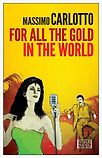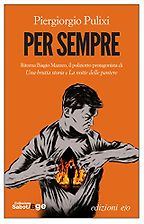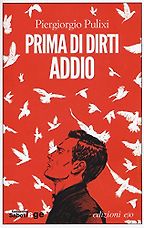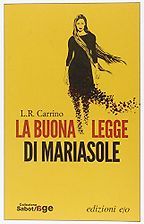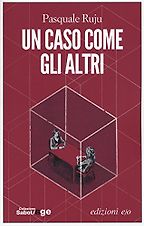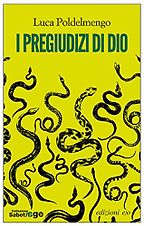You have said that, in Italy, if there’s something missing, it’s a sense of reality. You’ve also said that the ‘noir’ genre of crime fiction has always had a particular affinity for — or, ability to work with and in — the real world.
Yes, noir is very well positioned to relate reality precisely because its narrative formula dictates that there is a criminal story which occurs in a specific place and time. This provides an excuse to recount the social, political, economic and historical reality within the framework of a novel. This is a very important point for me and other writers who have developed a project which is not only personal but also collective, with its own dedicated publishing strand, precisely in order to find, through the noir genre, a way of narrating the various transformations actually taking place in Italy. So our novels are always sparked by reality – not by an isolated fact, but rather, we try to examine the wider context, constructing the plot in line with the investigative process and how this is experienced by a person.
Your own books are famed for their representation of real-life events and themes — from drug trafficking to police brutality during the G8 protests in Genoa in 2001 — but they’re also in some ways autobiographical: in the mid-1970s you were embroiled in a murder case, which became one of the longest criminal cases in Italian legal history. [Carlotto was fully exonerated in 1993.] Is there a sense in which writing noir is a kind of therapy, a process of seeking to understand the way Italy’s convoluted and corrupt systems work?
On a personal level, I exorcised all those demons in my first book – Il Fuggiasco (The Fugitive) in which I discussed the whole trial. But I think that when literature becomes a form of therapy for the author it becomes extremely tiresome. I see things differently – I chose this type of writing because it’s a social genre, not personal, and that’s what interests me.
The society documented is very specifically Italian. What is it that makes these books about the ins and outs of Italian society so successfully exportable around the world?
This type of narrative was the first to transform a territory into a character. And so the foreign reader, through this genre, is able to meet and get to know another world. For us, territory, or landscape, is truly a fully developed personality that lives and breathes within the novel – be it in terms of how it shapes the plot’s development or in terms of the sights, sounds, smells and tastes it brings. To appeal to foreign readers, this is crucial.
The Mediterranean noir, a genre of which you are a chief proponent [other famous Mediterranean noir writers include Jean-Claude Izzo, Andrea Camilleri and Enrico Teodorani.] is a case in point. The five authors we’re about to discuss, however, are all part of a much more recent wave of young noir writers – how do they sit with the old guard?
Mediterranean noir was born to narrate the effects of globalization on the development of relationships between different economic territories, specifically between crime organizations. The focus was on the interactions between three fundamental parts in our societies: entrepreneurship, finance and politics. This was a real novelty at the time. But the authors I’ve chosen today concern a very different reality – the reality being that those relationships have been utterly consolidated and transformed. The world conveyed in Mediterranean noir is now—necessarily—outdated.
Italy is famed for its complexity as a nation – it’s a country of countless, often conflicting, fragments. Your books seem to have been chosen with this multiplicity of voice in mind.
I chose them because they all share the same goal, that of telling the story of Italy in a certain way, but each of the titles is drawn from a very different territory. They differ wildly in style while sharing the same desire to narrate the transformations of their country using noir. I also chose them because they offer very refreshing takes on the genre as a whole – all of them treat the central issue of Italian corruption in highly original ways. The distinguishing factor for this recent wave, though, lies in whether the writers seek consolation through the novel or not. Of course, the books are all conceived to offer the reader all the things that a reader can hope to find in literature, but traditionally, the police novel—let’s take the great Camilleri, for example—has worked towards a resolution in which good triumphs over evil, the state triumphs over criminality. Speaking for myself and for these new authors, we don’t believe in this anymore. Our analysis of society is very different: we say that in this moment it’s the criminal cultures that are winning in Italy. We’ve arrived at a system in which there’s no need to murder people and commit the other acts that the mafia used to because criminality has legitimized itself – there’s no consolation in this. All the books I’ve chosen stand together on this point.
So let’s begin with Piergiorgio Pulixi. You’ve chosen two books by him—Per sempre [For always] and Prima di dirti addio [Before saying farewell]—and he’s also been chosen to represent Italy at two major international crime fiction events this year, Crime Writers Festival 2016 in New Delhi, and Deal Noir Festival in the UK – what is it that makes Pulixi such a key exponent of the genre?
Piergiorgio Pulixi tells us about a reality that in Italy is negated, but which unfortunately is a key part of life. He focuses on the clear and persistent corruption at the heart of the Italian police force. The cycle of Pulixi’s novels, which centres on the Inspector Biagio Mazzeo, is very important because it makes a very precise accusation: very many members of the police have read these books and have agreed with Pulixi’s portrayal. It’s true that the vast majority of police are honest, but there is a small minority who are dishonest, and this fact offered a way for Pulixi to shed light on the problem of corruption, considering it not simply as a national problem but as a wider European issue affecting all police forces.
When we think of police novels, and police dramas on television and in film, we often think of America foremost, but from Greece to Germany and throughout all our northern European territories, corruption has become an integral element in the repression, or not, of criminal activity – and this plays a key part in shaping the present relation between crime and society. In Italy, Pulixi develops this theme with an unrivalled bravery, and he always takes a real investigation as his starting point. He always starts from reality itself.
What kind of man is Pulixi’s protagonist Inspector Mazzeo?
The great originality in terms of police corruption here is that, while it used to be a question of individuals, it’s now much, much worse: we’re now talking of a banda, that is, of corruption on a group level. And this banda is perceived within the police force as a kind of family, a group of close friends who choose to work against the police from within. Pulixi has created this “family” and has made Inspector Mazzeo the father figure of it, a role that leads him into confrontations not only within the force itself but also with criminal organizations.
Prima di dirti addio, published just over a month ago, is the fourth and final book in the cycle, picking up when Per sempre left off. Now, the Inspector finds himself alone, without his “family”…
Yes, absolutely – this character is a perfect character for exploring how things work on the individual level as well as in a group. But to make a broader point about these books, one of Italy’s problems is that there are no more [journalistic] investigations into crime – that is to say, citizens no longer have the right to read punctual, in-depth accounts of the criminal individuals and activities which shape their lives. So a novel of this type, born from very specific circumstances, allows them to see inside their own reality.
Pulixi’s books are said to be saturated with the philosophy expounded by the writers’ collective known as ‘Sabot,’ a group that, since its conception in the late 2000s, has included writers such as Francesco Abate and Michele Ledda as well as yourself. What distinguishes this strand of noir?
The name Sabot comes from the French word for the clogs which, during the industrial revolution, workers would chuck at the machines to slow them down when they couldn’t keep up with the pace of production. When they were tired and just couldn’t go on, they would throw their clog into the cogs of the machine as a protest. We, as writers, throw our clog at a machine of information that has ceased to inform us. We want to tell the stories which are ignored by the machine and which are harder to come by. These writers have, on the one hand, learned the ways of the novel—be it noir, police, thriller etc—and on the other, they have educated themselves in the ways of investigative criminal journalism. The work is thus a novel/investigation in which, instead of plucking inspiration from his own imagination, authors like Pulixi pluck it from real, evidential life.
The next book, La buona legge di Mariasole [The good law of Mariasole] by Luigi Romolo Carrino, is a book that, like Pulixi’s, hinges on a central conflict between good and evil, heart and head.
Yes, but here Carrino, a Neapolitan, frames the story of the Camorra [the Neapolitan mafia] in a very literary way – the Camorra he describes is very different to that which we are used to hearing about. It’s as though he’s describing it from the inside – he has such a deep understanding of characters, and conveys a complexity we have never met before. He delves so far down into these characters’ souls, and it’s incredible, too, how he has been able to tell things from a female perspective.
Five Books interviews are expensive to produce. If you're enjoying this interview, please support us by donating a small amount.
Because Carrino has chosen a woman, Mariasole, as his protagonist, the widow of one of the main players in the Camorra, thereby allowing us to explore different sorts of themes…
Yes, but Carrino’s aim is more than simply a literary exercise – again, it’s born from reality. The character of Mariasole is an absolutely real one, who exists in the great mystery that is the relationship between the female universe and the criminal universe. Her character lifts the veil on certain aspects of this relationship, prompting a series of questions which we, as readers, are not used to considering – for example: how does the wife fit into the relationship between father and son in the clan? Mariasole is a revolution because she inverts roles – she is fiercely strategic in the way she lives her life, which differs from the submissiveness that we tend to associate with women in criminal contexts. Her relationship with her son is very different to that which we might expect, too. The story begins with a great scene in which the mother and son attend the funeral of Giovanni, Mariasole’s husband and the boy’s father, after which Mariasole starts doing everything in her power to facilitate the accession to power of her son within the clan, navigating every obstacle to achieve this goal. The mafia is all about power passed down from one man to the next but here we have a woman of great intelligence, ingenuity and humanity who manages to take control of the pedals.
“Our analysis of society is very different: we say that in this moment it’s the criminal cultures that are winning in Italy. ”
The territory as character is, again, key, with the shadow of
Vesuvius stretching across Carrino’s narrative, as a symbol of barely suppressed violence…
Naples represents a very important place for us to focus on when trying to discover what is going on in Italy. Naples represents tradition, for better and for worse, as well as modernity, for better and for worse. Neapolitan writers are able to see both sides of this city that is loved by foreigners at the same time as being full of conflict for many Italians.
Your next book—Un caso come gli altri [A case like any other] by Pasquale Ruju—seems to do away with landscape almost entirely, the majority of the narrative unfurling within the confines of a small interrogation room.
Exactly that, but with a coup de theatre at the end which I won’t divulge here. Pasquale Ruju is extremely famous in Italy because he is a writer for comics and graphic novels and it’s fascinating to see how this translates to a different medium – that of the novel. He has written a compelling narrative which takes as its protagonists two women, one of whom belongs to the ’Ndrangheta [the Calabrian mafia], an organization which is unique, unlike the Camorra or other criminal organizations. Ruju tells the story of how this woman fell in love with a man who revealed himself to be very different to that which he first appeared, and we get the whole arc of her life as she moves through this totally oppressive system, and in the end liberates herself from it, in one way or another. She frees herself from this situation by paying a truly high price. The construction of the characters is very realistic. There’s also the fact that it’s pretty hard to find novels about the ’Ndrangheta – there aren’t very many Calabrese writers and there doesn’t seem to be much interest in the ’Ndrangheta. Ruju, even though he’s Sardinian, lives in Turin—Turin being a city that is historically, since 1974, very infiltrated by the ’Ndrangheta—so it was possible for him to conduct in-depth investigations into the workings of the ’Ndrangheta for the purposes of this novel.
You mentioned your interest in how Ruju’s background in comics colours his novel; for most of his life, though, he has also worked in film, as a dubber for cinema as well as soap operas.
He’s an extraordinary man. His writing is highly visual – it’s clear that when he wrote this, the graphic world was ever-present to him; he writes scenes so that the reader can really see them. I know that he’s working on the follow up novel to this one and I can’t wait to read it.
Ruju and Carrino may have placed women at the centre of their narratives but, as we approach the final book, it’s impossible to ignore that all of the authors you have chosen are men. Noir seems to be an intrinsically male genre.
It is. I’m very involved in the scouting of women writers for this very reason, because the female point of view is essential, in that whenever we do find women writing noir, they always bring something more to the table. The female perspective on criminality, on good and evil in general, is absolutely fascinating. Giorgia Lepore, a writer from Puglia, is one to watch – her first novel is forthcoming. But, yes, it’s vitally important that we bring more women into noir.
Your last book is Luca Poldelmengo’s I pregiudizi di Dio [God’s prejudices], which, funnily enough, begins in the wake of the disappearance of a woman—Alice, the wife of Chief Inspector Andrea Valente and the mother of his son. The body of a woman is discovered—a young mother who has been brutally raped. What vision of Italy is Poldelmengo offering us? I’m thinking in particular of the novel’s portrayal of a mud-slinging media and its moralistic, curtain-twitching consumers, ever-ready to condemn each other.
Luca Poldelmengo is intimately familiar with the multiple mechanisms of investigation and this lies at the heart of his novels. In this novel, what’s particularly interesting is that he approaches the investigation from the points of view of three completely different characters, and he holds them all up against each other to ask a pivotal question about the influence on the investigation process of personal perspective. There is no such thing as an objective stance in investigating something, it’s always subjective because it’s bound to the investigator. Poldelmengo, by bringing different views together, unhinges the assumptions of each character, forcing them to reveal the depths of their own humanity and the relationship of their account of things to a wider reality which is obviously far more complex.
And Poldelmengo’s descriptions of the territory are so absorbing…
He is really meticulous – he’s driven by a desire to depict the places in his novel down to the enth degree. His writing is really photographic. But even if the places he takes us to aren’t immediately recognizable—Mandela, a tiny commune on the outskirts of Rome where the body is found, will only be known to those with a very clear idea of the area—readers feel a wider sense of familiarity with the places. Of all the authors here, Poldelmengo is probably the one with the tightest grasp when it comes to describing the territory of his novels.
How do you predict that Italian noir will evolve to keep pace with wider social and political changes in the country—from the rebirth of the far-Right to the deep cuts of austerity, for example—and are there any issues that haven’t been sufficiently confronted?
First up is the extent to which the most recent financial crisis has modified us from the inside. I think that the changes that the crisis has triggered on a deeply individual level have yet to be properly explored in literature as a whole—and perhaps especially by noir—and I expect this to become more of a theme in coming years. The country is constantly transforming—for the most part not in a good way—and this will require a continuous process of reconsideration and re-reading, and perhaps we need new forms in which to tell these stories. Noir in Italy—well, all genres in Italy, really—are in need of a new phase, as well as a new internal reckoning; we need the kind of self-scrutiny that used to be much more common a while back, when authors seemed to stand together more in groups. Things seem more frayed now, in the sense that individual authors tend to be perceived in isolation. That’s one of the reasons genre-specific series and collectives like Sabot are so important – they create a network of writers who are constantly working with each other and questioning how what each is doing fits into the whole.
Translation by Thea Lenarduzzi
Five Books aims to keep its book recommendations and interviews up to date. If you are the interviewee and would like to update your choice of books (or even just what you say about them) please email us at [email protected]

